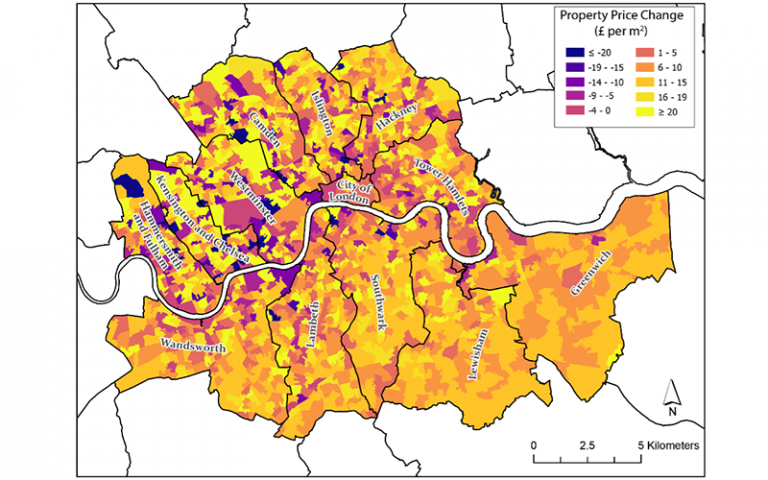London house price increases linked to areas with more Airbnbs
29 March 2021
Areas in London with more Airbnb listings are more likely to see increases in house prices, according to a team of UCL researchers.

In a study published in Environment and Planning B: Urban Analytics and City Science, UCL researchers were able to track the relationship between the number of properties listed on the short-term letting platform and the changes in house price in the area – measured in £ per square metre - using a comprehensive listings database and house price data.
Across Central London, researchers found a tendency towards increased house prices in areas with more Airbnb listings, with large parts of Kensington and Chelsea, Westminster and Camden exceeding rises of £20 per m2 per month from January 2015 to May 2018. The highest increases across the city as a whole occurred north of the River Thames, with more modest growth towards the South and East.
Despite the generally positive trend, the findings also revealed important contrasts where some areas had a negative association with house prices and experienced reductions of more than £20 per m2.
Whilst more research is needed to understand why such differences occur, the findings paint the most detailed picture yet of Airbnb’s interaction with the London housing market. With boroughs broken down into smaller areas containing between just 400 and 1,200 households, the researchers argue that the level of granularity presented provides local decision-makers with the detail needed to produce better, more localised, housing policy to inform regeneration strategies.
Professor James Cheshire (UCL Geography) said: “The housing market in London is complex and there is still a lot we don’t know about how platforms such as Airbnb are interacting with local price fluctuations. Thanks to the detail in this analysis, we can begin to take a closer look to understand some of the patterns that are emerging and the reasoning behind these.”
Whilst the data used in the analysis span January 2015 to May 2018 and capture a pre-pandemic city, the researchers believe their findings could help to inform London’s Covid-19 recovery.
“Central London’s rental market has cooled dramatically over the last year, as many workers and tourists have left the city during lockdown, so we have an opportunity to influence its recovery,” Professor Cheshire added. “Policymakers can either help areas return to business as usual - or take a closer look at both the costs and the benefits that platforms like Airbnb can bring to communities”.
Currently, London is one of a handful of cities on Airbnb to have restrictions on the number of days “entire home” listings can be occupied per year, which is no more than 90 days. Introduced in 2017, this measure was implemented by the platform to ensure the sustainable and responsible growth of home sharing in the city.
The research team note that previous studies have found that Airbnb takes up around 1.4% of the total housing supply in London.
The data used in the study were supplied by the ESRC-funded Consumer Data Research Centre and the analysis was conducted by James Todd (UCL Geography), Dr Anwar Musah (UCL Institute for Risk & Disaster Reduction) and Professor James Cheshire (UCL Geography and Consumer Data Research Centre).
Links
- Read the full study in Environment and Planning B: Urban Analytics and City Science
- Professor James Cheshire's academic profile
- James Todd's academic profile
- Dr Anwar Musah academic profile
- UCL Geography
- UCL Institute for Risk & Disaster Reduction
Image
Image credit: James Todd, Anwar Musah, James Cheshire
Media contact
Evie Calder
Tel: +44 20 7679 8557
Email: e.calder [at] ucl.ac.uk
 Close
Close

